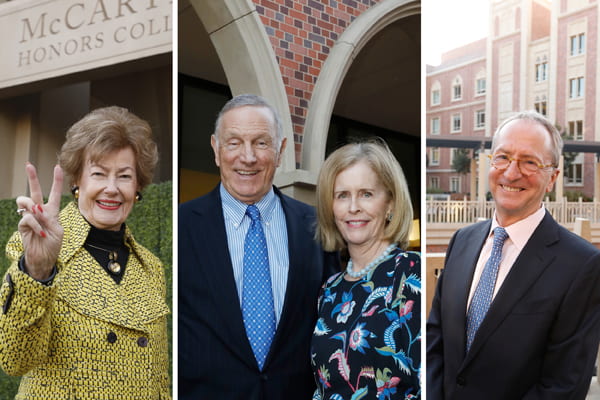This has been a wonderful month at USC, as Los Angeles experienced its first sustained rains of the season. We always welcome water in drought-prone California, but at USC, we welcome it even more enthusiastically this year, as our new USC Village features a massive rainwater capture system. These six wells stretch 60 feet below the ground, and can accommodate 198,000 gallons of rainwater, which enter the tanks through tubes. A filtration system blocks trash and eliminates harmful materials, such as oil, before passing the water to aquifers. This forms the largest privately-owned stormwater containment system in Los Angeles, and helps protect the Ballona Creek Watershed and Santa Monica Bay. A great feature of our USC Village!
USC in London
In February, I led a delegation of USC trustees, deans, and senior leadership to London, where among our many activities, we hosted a special reception for alumni, parents, prospective students, and heads of school. We also had productive visits to Cambridge University and the London School of Economics, where we have many academic partnerships, including student exchanges, degree programs, and shared faculty. Another highlight was officially opening USC’s ninth international office: this one in the heart of London. These international offices function like embassies for our university, serving as centers for recruiting, education, and research partnerships in the region. Beyond the United Kingdom, the London office will connect us more broadly with continental Europe, and joins our already-established offices in Beijing, Hong Kong, Mexico City, Mumbai, São Paulo, Seoul, Shanghai, and Taipei.
Finally, during our time in London, we hosted a very successful entrepreneurship “Hackathon” for teams of students from area secondary schools. USC Viterbi Professor Hao Li and two USC undergraduates with successful startups—Riley Testut in engineering and Aimee Zhang in cinematic arts’ gaming program—served as the hackathon coaches and mentors. The local students competed to pitch a tech startup, and left the event inspired and enthusiastic about USC!
Connecting names with faces
Returning to campus, we hosted receptions that brought together the namesakes of three of the residential colleges at the USC Village with the students who live in those residences. These events honored the benefactors—David Bohnett, Charles and Jessie Cale, and Kathleen Leavey McCarthy—and featured student speakers. These students are among the very first to live in one of the eight residential colleges at the USC Village, and their enthusiasm—as well as their dedication to civic engagement—shone through in their remarks. At these receptions, I was so pleased for our students to learn the personal stories of the namesake benefactors, as these stellar philanthropists can inspire our students, and serve as enduring role models.
USC Neighborhood Academic Initiative
On a recent Saturday morning, I visited with students and parents of USC’s Neighborhood Academic Initiative (NAI), and shared my own story as a first-generation college student. I told the families that my own mother dreamed I would one day become a high school teacher. It was indeed a privilege to speak to a group that remains so steadfastly dedicated to education and to pursuing a brighter future. NAI remains such a source of pride for everyone in the Trojan Family.
Since 1997, more than 1,000 students have completed the NAI program. Their college acceptance rate is 100 percent, and their college attendance rate is 99 percent. Most of these students attend USC, but others have gone to Harvard, West Point, and other top institutions. If they are accepted at USC, they attend for free; and among those who have come to USC, their graduation rate is a remarkable 92 percent. To NAI students and their families, we say: Fight On!
Virtual reality research at USC
USC has long been a pioneer in the area of virtual reality, and in a recent op-ed I published in The Wall Street Journal, I focused on how our researchers apply this technology to treat post-traumatic stress disorder (PTSD). The USC Institute for Creative Technologies—in partnership with the United States Department of Defense—is developing Bravemind, which brings virtual reality exposure therapy to veterans with PTSD. Their groundbreaking work is truly extraordinary! As virtual reality transforms the digital gaming industry, the technology that underpins its advancement holds far more promise than mere entertainment. It offers new hope to those for whom looking back has been a barrier to moving forward.
Niki and I hope you are enjoying spring, and look forward to writing again next month!
Sincerely,
C. L. Max Nikias
President
